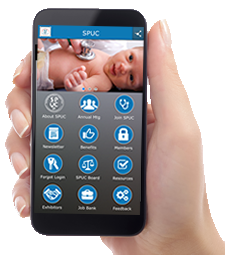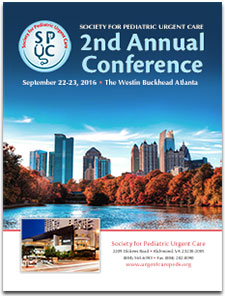News Briefs
Urgent Care Updates
The Society for Pediatric Urgent Care is preparing to offer certification and accreditation to urgent care facilities. The SPUC Board of Directors approved the concept during the recent Board of Directors meeting in NYC in June. The board recommended a task force be created for the initiative, led by Drs Robert Cooper and Darla Gallentine. Updates and opportunities to join the task force will be provided during the Leadership Summit in Atlanta on September 21st as well as during the regular meeting committee lunch on September 22nd.
Our goal is to offer certification to urgent care facilities providing care to a large number of children in a general urgent care setting as well as to offer accreditation to pediatric-specific facilities offering specialized urgent care to the pediatric population. Certification and accreditation would ensure that families seeking urgent care services for their children can be confident that their child is receiving quality care which meets standards set forth by us. This is a giant step towards the standardization of pediatric urgent care as well as towards recognizing that pediatric patients pose a special circumstance in the urgent care setting.
Any member interested in participating should contact Dr. Robert Cooper (Robert.cooper@nemours.org) or Dr. Darla Gallentine (sickkids@bellsouth.net) or post questions and comments in the SPUC listserv.
Research Updates
Urgent Care and Medicaid Savings
SPUC Member, Amanda Montalbano, MD, MPH, FAAP, was recently published in the April 2016 issue of Pediatrics. Her article commented on the significant cost savings which could occur if lower acuity Medicaid visits were shifted from the ED setting to the UC setting.
You can find the whole article at http://pediatrics.aappublications.org/content/137/4/peds.2015-3100.
The abstract is posted below.
Pediatrics
April 2016, VOLUME 137 / ISSUE 4
Urgent Care and Emergency Department Visits in the Pediatric Medicaid Population
Amanda Montalbano, Jonathan Rodean, Juhi Kangas, Brian Lee, Matt HallBACKGROUND: Urgent care (UC) is one of the fastest growing venues of health care delivery. We compared clinical and cost attributes of pediatric UC and emergency department (ED) visits that did not result in admission.
METHODS: Our study examined 5 925 568 ED and UC visits of children under 19 years old in the 2010 through 2012 Marketscan Medicaid Multi-State Database. Basic demographics, diagnoses, severity, and payments were compared. Between ED and UC visits, χ2 tests were used for proportions and Wilcoxon rank-sum tests were used for continuous variables.
RESULTS: The UC and ED had the same most common diagnoses. Over half the UC visits were low severity. The ED had a higher rate of return within 7 days (8.4% vs 6.9%, P < .001) and follow-up with their primary care physician (22% vs 17.2%, P < .001). Few (<1%) were admitted on return visits from the ED or UC. Payments for UC were significantly less (median $76.90 vs $186.20, P < .001). This continued to hold true when comparing payments for selected diagnoses and each severity level. By extrapolating the cost savings, a national Medicaid per-year savings, if all lowest severity level visits were seen in UC, was more than $50 million.
CONCLUSIONS: UC and ED Medicaid visits have similar most common diagnoses, rate of return, and admission. Severity level and payments were lower in UC. There is potential significant cost savings if lower acuity cases can be transitioned from the ED to UC.
Urgent Care OUCH Database
The Society of Pediatric Urgent Care and the Subcommittee of Urgent Care (under the Section of Emergency Medicine of the AAP) have elected Dr. Montalbano to lead research efforts in these two collaborative organizations. She is currently collecting data from a pilot survey to establish the Organization of Urgent Care Health (OUCH) Database. The pilot survey includes administrative data that will help establish national standards, benchmarks, and scope of care for pediatric urgent care centers. This data was presented at the Pediatric Clinical Research Network SIG meeting at the Academic Pediatric Societies annual meeting in Baltimore. We received helpful feedback from the group about further direction moving forward as well as lessons learned from other networks like CORNET, PRIS, and BORN.
Do you have data to contribute to this database? See the email from Dr. Montalbano below!
Hello Pediatric Urgent Care Provider,
We would like to invite you to participate in the first national survey of pediatric urgent care centers. We are hoping to reach administrators, medical directors, and division leaders to complete this short, but rather comprehensive survey about the daily operation of your pediatric urgent care center. We ask that if you are unable to answer these questions regarding salaries, staffing, and scope - please forward this link to someone in your center who may be able to complete the survey.
The survey has been deemed non-human subjects by the IRB at Children's Mercy Hospital in Kansas City, MO. This survey is completely voluntary. The results of the survey will be disclosed at the PUCC conference in New York in June 2016. We hope to publish the results to reach a larger audience as well. We encourage you to be complete in your answers as the more information we collect, the more information we can supply you!
There are a few metrics that will likely require some data collection. Feel free to save your work and return to the survey when you have the metrics data. If you have questions regarding the survey, feel free to contact me using the information below.
*** You may save your work and return to the survey, but you must record the "return code" prior to closing the survey to be able to retrieve your completed work. ***
Click on the link to participate. If the hyperlink does not open, please copy and paste the link into your browser window.
https://urldefense.proofpoint.com/v2/url?u=https-3A__cmhredcap.cmh.edu_surveys_-3Fs-3DR8CNJRKFJE&d=CwIFAw&c=P0c35rBvlN7D8BNx7kSJTg&r=oTuClpJQ4ptZpJYRh9UoYx1h2Ibuco0cNS6hU31P5Yw&m=0709hOdQlUBobWVtVU_r5zGk_8xuGpoBfWbf5d93PmI&s=vGVyG971Jpqe-9or_Soz57h74eX51PxA3loVs9ODGsM&e=
Thanks again,
Amanda
Amanda Montalbano, MD, MPH, FAAP




